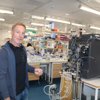-

The art of building a biologic drug
The first biosimilar from Xbrane Biopharma was launched earlier this year, and several more are under development at the company’s facility in Solna, Sweden. “We do everything in-house ‒ from DNA fragments to a final process,” says David Vikström, Chief Technology Officer at the company.
-

High biological age is linked to a higher risk of dementia and stroke
It is a well-known fact that people age at different rates, and a recent study at the Karolinska Institute suggests that people with a biological age higher than their actual age are significantly more likely to suffer from dementia and stroke.
-

Founder of Bioarctic, Lars Lannfelt, is honoured: “I want to create something for the future”
It´s like a scientist’s dream: to be the world’s first with a drug that genuinely affects one of our major diseases. Lars Lannfelt and his company Bioarctic have achieved just that, and they are thus making a significant contribution to the history of Swedish medicine. He is now being awarded the Research!Sweden Award 2023.
-

Alzecure ser dubbel verkan med läkemedelsplattform
Forskningsbolaget Alzecure Pharma, som arbetar med projekt inom Alzheimers sjukdom, ser med Alzstatinplattformen möjlighet att motverka Alzheimers sjukdom på två olika sätt. Dels genom minskad produktion av ett skadligt protein, dels genom att förändra förhållandet mellan vissa specifika amyloidbeta (Aß) peptider i hjärnan.
-

The first drugs to slow down Alzheimer’s – but what does it mean for patients?
New treatments for early Alzheimer’s are bringing hope to thousands of patients and their families. The question is, who will get the treatment, how will the right patients be found in time, and will the healthcare system’s resources be sufficient? Life Science Sweden has spoken to Swedish researchers in Alzheimer’s who voice cautious hope but also see further challenges.
-

Marie Gårdmark: ”The situation is not satisfactory”
”The legislative tool-box is limited, but carrots in the form of longer exclusivity has already proven successful, this has for example increased registration of new products in rare diseases. But will it also work to increase access for all EU patients?” writes Marie Gårdmark in a column.
-

Charlotta Gummeson leaves Sahlgrenska Science Park – “It feels sad and exciting at the same time”
With mixed emotions, Charlotta Gummeson will leave her position as CEO of Sahlgrenska Science Park in October. “It feels sad and exciting at the same time. I’ve been in the thick of things and part of the development for so long now, but I’m also looking forward and thinking about all the new things that there will be in a freer role,” she says to Life Science Sweden
-

Astra Zeneca’s Sweden CEO: “We have great faith in our portfolio”
It all started with a summer job as an operator at Astra’s chemical factory in Snäckviken, just outside Södertälje. More than three decades and countless different assignments later, Per Alfredsson, born and raised in Södertälje, is CEO of Astra Zeneca Sweden, which employs 7800 people in Södertälje, Stockholm and Gothenburg. “It was a very special feeling to be in charge of the entire organisation,” he says in an interview about his career and potential future blockbusters.
-

Why the world renown researcher Marc Tessier-Lavigne resigns as Stanford´s president
In mid-summer, neuroscientist Marc Tessier-Lavigne announced his resignation as President of Stanford following allegations of manipulated study data. According to the reporter Theo Baker, who first reported the story, Tessier-Lavigne “rewarded the winners and punished the losers”. Here is the background of the story which has shaken the American scientific community over the summer.
-

Anna Törner: The minute between life and death
“I have never told anyone about this day that happened more than 20 years ago. But I sometimes reflect on what happened, on what might have happened. When I try to understand why I haven’t told anyone, I find the answer: a feeling of shame. There is no forgiveness for something like this, even though it is very human to be distracted for a moment,” Anna Törner writes in a column.
-

Nanoparticles to help detect pulmonary disease
Nanoparticles behave in a certain way in the air. Using this knowledge, researchers at Lund University have developed a new measurement method for lung examinations based on the phenomenon.
-

Uncertainty about the government’s life science work
The government’s national coordinator for life science, Jenni Nordborg, left her position almost four months ago. No one has yet succeeded her, and now questions are being raised both about the government’s plans for the office and the Swedish life science strategy.
-

Column: ”Life as a F1 race”
"The F1 car makes several pit stops during a race and during a lifetime the human being may also have to come in several times for maintenance", Björn Ursing writes in a column.
-

Individual DNA passport could result in fewer drug side effects
You may be required to show a DNA passport when you pick up medicines at the pharmacy in the future. According to a new study, patients might suffer 30% fewer side effects if the drug treatment is adapted to their genes.
Få tillgång till allt innehåll på Life Science Sweden
Ingen bindningstid eller kortinformation krävs
Redan prenumerant? Logga in
Gäller endast personlig prenumeration.
Kontakta oss för en företagslösning.